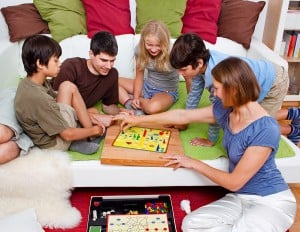 Most parents find that as their children grow into middle school and teenage years, they want to spend less time with them and more time with their friends.
Most parents find that as their children grow into middle school and teenage years, they want to spend less time with them and more time with their friends.
While you want your kids to be independent and have an active, fun-filled life, it can feel like you are being abandoned.
You could also feel you are left to be the cook, maid, and chauffeur without getting any of the “quality time” that you want.
So how do you go about coaching and mentoring your children to be individuals but have them still want to spend time with their families?
Keeping in mind that relationships are always two-sided, it is important to recognize that in order to accomplish this goal, you must work on both sides: the kids and the parents.
When working on any relationship or communication issue, it is always helpful to start with yourself. The only person you can really change is you, so by starting there, you set the stage for greater cooperation and you set a great example for your children to model their actions after.
Do you allow quality time for your kids, or are you only available to them on your schedule? After work? After you spend time with your own friends? Are the majority of your conversations with your children about getting their homework or chores done?
If the answer to any of these questions is yes, then check in with your Internal Guidance System to determine what actions you can take to change the dynamic in your relationship.
If you are supportive of your children spending time with their friends, but feel that there needs to be more balance between friends and family time, then there are certain things you can do to achieve your objective of having more family time.
First, all parents must let go of needing to know how this will happen. The “how” is not your job. If you are clear about our intention and willing to check in with your Internal Guidance System, you will be able to receive clues and take inspired action that will create this new balance.
As with all relationships, another key is clear communication. Just because you raised them, you cannot expect your children to be able to read your mind. Let them know that you want them to spend time with their friends, but you also want family time. Open the discussion so they have the opportunity to let you know how they think this could happen.
You can practice this technique with kids of any age, knowing that as they grow and their interests change, their responses will also undoubtedly change. Perhaps your daughter liked to go to shopping with you when she was younger, but that is something she would rather do with friends when she is a teen. Your son may have wanted you at every sporting event when he was younger, but once he got his driver’s license, he felt more independent going on his own.
Instead of insisting on continuing in family time that worked in the past, this can be an opportunity to learn more about your children as the people they are becoming. In the beginning, it can be helpful to have some suggestions for activities, but be open to going “off-script” and trying something different.
Perhaps they would enjoy helping cook a special meal together or even take a cooking class with you. You might enjoy going on a hike as a family or going to the neighborhood park, pool, or to the shore. Sometimes you and one of your children might want to schedule one-on-one time away from the other kids.
As your kids are developing this skill, it will be up to you to open up the discussion and schedule the time you want as a family. After a while, they will learn how to create the balance themselves and you will find that they are asking to set aside time together.
Let the time together be somewhat flexible, allowing all of you to check in with your IGS to see what feels right. As a parent, you may set down specific rules that the entire family must adhere to, such as “we are all home for dinner,” but other times and activities can be more loosely structured.
By keeping the dialogue open about what “family time” means, and how each side of the relationship can feel supported and respected, you will grow closer as parent-child and as a family.
Your kids will learn to check in with their Internal Guidance System to know how they are feeling about all of their relationships. This will lead them to take the inspired action that will foster the most positive ones — including their relationship with you. This is a skill that they will be able to carry forward into their adult relationships and someday teach their own children.
© 2014. Sharon Ballantine. All Rights Reserved.

